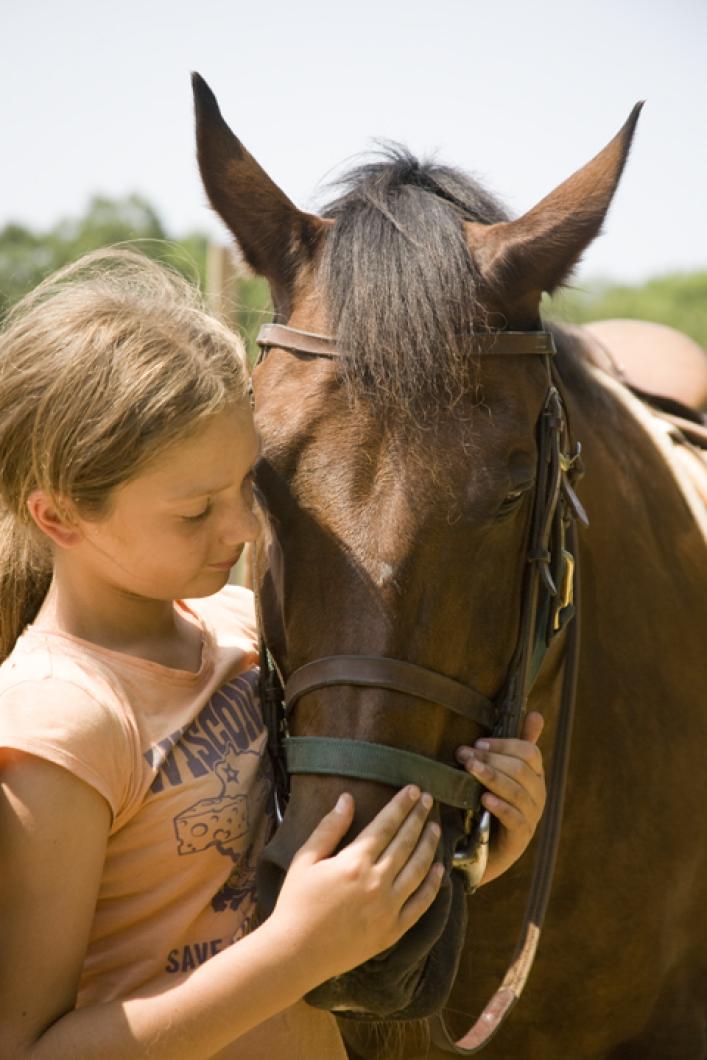Horses have been a passion of mine for almost as long as I can remember. These beautiful, majestic creatures are powerful and graceful at the same time. They have been used for thousands of years for farming, transportation, pleasure and companionship. I believe that once you are bitten by the horse bug, you are stricken for a lifetime of longing: longing to be seated in a well-worn saddle, longing for the smell of hay and leather combined with the earthiness of manure, longing to feel the powerful creature beneath you whether at a comfortable walk or a powerful gallop through a field, longing to hear a snicker as you approach with a small treat just for them.
Earlier this summer my husband and I took our daughter for a pony ride in Chilmark at the church fair and I was beside myself with the aromas coming from the little fat pony she was riding bareback around a mowed field. It reminded me of my younger days of taking lessons at Misty Meadows horse farm on a little white pony named Chubbs; this was over 30 years ago, but so important to me that I remember his name today. I began riding lessons at the age of five and continued through college. After college graduation, I moved into my own apartment and began working full-time; I did not have much time or money to continue riding. Dogs became my full-time, living breathing passion and horses, like childhood, became a fond memory.
Now with less money and a different concept on what free time is as the mother of an active three-year-old, I have decided to pick up the reins again and get back into horses. How, you may ask? I have begun volunteering at the Rising Tides Therapeutic Equestrian Center in West Tisbury. This small facility is devoted to helping physically, emotionally and learning disabled children and adults improve their quality of life through interactions with horses.
Individuals with mental and physical disabilities such as Down syndrome, autism, hearing and visual impairments are all able to mount a well-suited horse and ride around the ring. These riders are able to gain confidence and self-esteem; it can also increase motor function, flexibility and coordination in a way that standard physical therapy cannot teach all through therapeutic horsemanship. Therapeutic horsemanship encompasses many activities that partner with the horse. Based on input from therapists, teachers, doctors, and parents, the client’s individual goals are designed to complement ongoing therapy and education.
Benefits of the equine experience are threefold:
• Physical — The motion of the horse stimulates the rider much like the motion of walking. Riding also relaxes and strengthens muscles while improving muscle tone, posture, balance, joint mobility, and coordination.
• Emotional — Interactions with horses provide a noncompetitive setting for learning new abilities, self discipline and improved concentration which all help in building self-confidence.
• Social — Horseback riding nurtures a positive self-image. Riders and handlers experience independence plus a sense of being part of a team.
As a volunteer I am able to feed my desire to be around horses and help out those in need, what a great combination. I assist in brushing and tacking up (putting on the saddle and bridle) and then lead the horses into and around the ring for their lessons. The lessons consist of walking, trotting, stretching and even games. If time and ability allow, oftentimes there are trail rides after the first part of the lesson is complete. For less able participants, there are side walkers; these individuals actually walk along beside the horse to be sure that the participant stays on the horse and that their legs are not inadvertently kicking or prodding the horses.
The games consist of retrieving objects placed on the posts of the riding arena. Objects like colored stars or bean bags which are collected by the participants along the rail and then tossed into a bucket which is at the center of the ring. This helps with coordination, balance, color recognition etc. There are other items such as a mailbox and a basketball hoop, both of which can also be used to aid in therapy.
After lessons, the tack is removed from the horses; they are brushed again and occasionally given a bath to cool down. Then the horses are allowed to relax and recharge in their paddocks, munching on hay in the shade. The tack is cleaned and put away for the next participant.
The Rising Tide Center is a nonprofit organization that needs our help to continue to provide their services to the participants. You can visit their Web site (risingtidetec.org) to learn more about their need for volunteers and donations. They are having a fundraiser on August 19 from 5:30 to 8:30 p.m. at a private venue in Vineyard Haven; there will be a cocktail party and auction. More information may be found on their Web site. Please join me in supporting this wonderful, necessary not-for-profit organization.
Laura Hearn Caruso lives in West Tisbury.




Comments
Comment policy »